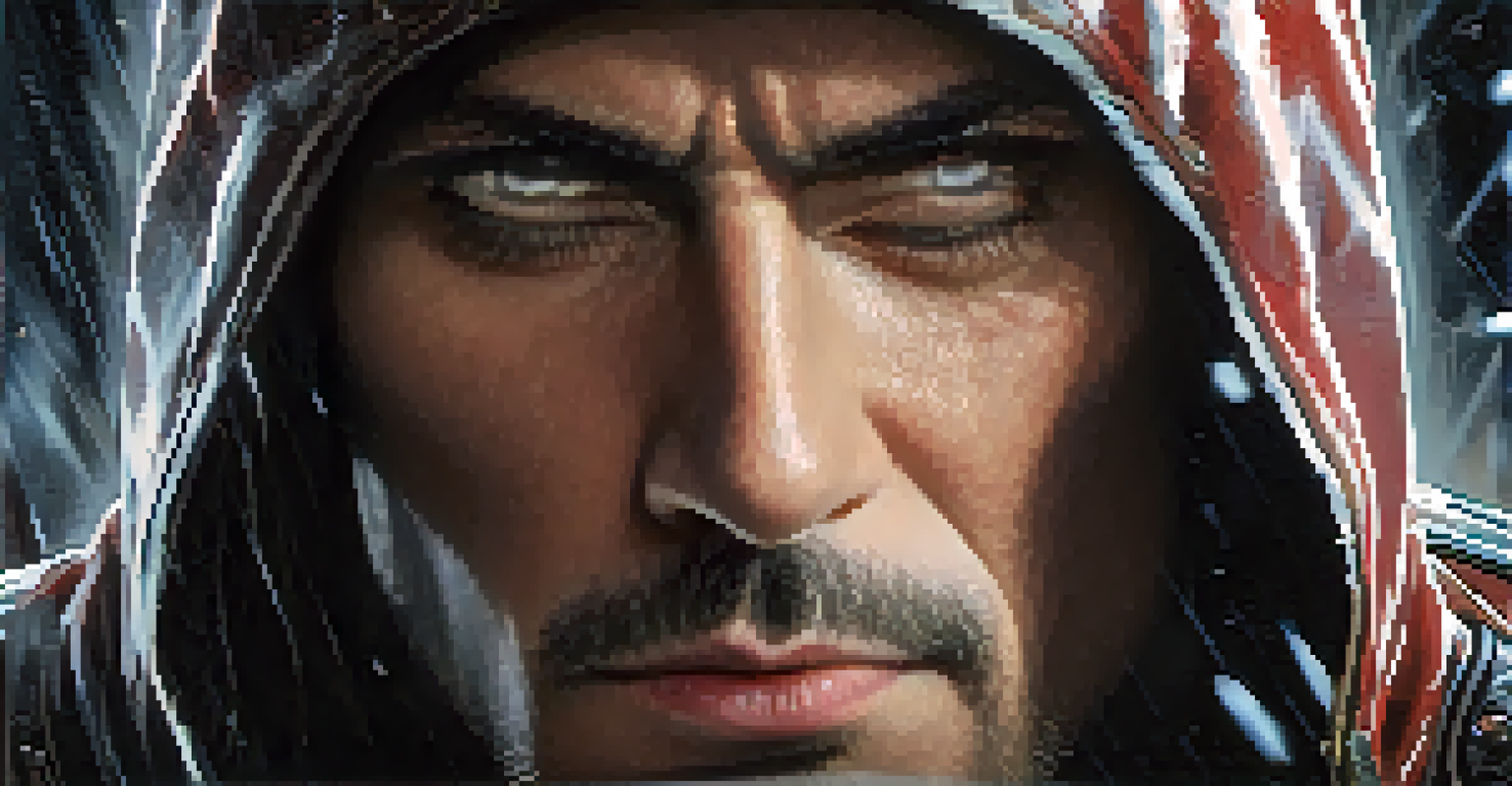Why Hollywood's Villains Often Have Mental Health Issues

The Archetype of the Troubled Villain in Film
Hollywood has a long-standing tradition of depicting villains as psychologically complex characters. These representations often highlight their mental health issues, making them more relatable yet terrifying. This archetype allows audiences to explore darker themes while understanding the psychological struggles behind the villain's actions.
The greatest trick the Devil ever pulled was convincing the world he didn't exist.
For instance, characters like the Joker from DC Comics showcase a blend of charm and madness, drawing viewers into their chaotic world. This complexity invites viewers to ponder what drives people to commit heinous acts, blurring the lines between good and evil. Ultimately, these portrayals serve to engage audiences on a deeper level, transforming villains into figures of intrigue rather than mere antagonists.
Moreover, this trend reflects a broader cultural conversation about mental health, making it a relevant topic for both filmmakers and audiences. By humanizing villains through their struggles with mental health, Hollywood not only entertains but also sparks important discussions about these issues in society.
The Impact of Mental Illness on Character Development
Mental health issues offer a rich canvas for character development, allowing filmmakers to craft multi-dimensional villains. These complexities make the villain's motives more profound, often leading to empathy from the audience. When viewers can see the personal struggles behind a villain's actions, it creates a more nuanced narrative that goes beyond simple good versus evil.

Take, for example, Norman Bates from 'Psycho.' His struggles with identity and mental health make him a chilling yet fascinating character, compelling audiences to understand his tragic backstory. This depth not only enhances the storytelling but also creates a more engaging viewing experience, pulling viewers into the psychological turmoil of the character.
Villains as Complex Characters
Hollywood increasingly portrays villains with psychological depth, allowing audiences to explore their motivations and the darker themes of mental health.
By exploring these themes, filmmakers can challenge stereotypes around mental illness, portraying it as a multifaceted issue rather than a one-dimensional trait. This approach fosters a more significant understanding of mental health in real life, encouraging audiences to consider the complexities of such conditions.
How Stereotypes Shape Our Perception of Villains
Stereotypes surrounding mental health can heavily influence how villains are portrayed in film. Often, these portrayals lean into harmful clichés, framing mental illness as synonymous with danger or evil. This not only misrepresents the reality of mental health conditions but also perpetuates stigma, affecting how society views those who struggle with similar issues.
We are all broken, that's how the light gets in.
For instance, films that depict characters with schizophrenia as violent can reinforce misconceptions that people with mental health disorders are inherently dangerous. These portrayals can lead to fear and misunderstanding, overshadowing the fact that most individuals with mental health issues are not violent at all. The challenge lies in creating villains that are psychologically complex without relying solely on these damaging stereotypes.
Ultimately, it's crucial for filmmakers to balance storytelling with sensitivity, ensuring characters are both engaging and authentic. By doing so, they can contribute to a more accurate representation of mental health in media, paving the way for better understanding and acceptance.
The Role of Sympathy in Villain Narratives
Sympathy plays a significant role in how audiences perceive villains with mental health issues. When viewers can empathize with a character's struggles, it adds layers to the narrative, allowing for a more profound emotional connection. This connection can transform a villain from a simple antagonist into a tragic figure, eliciting both fear and pity from the audience.
Consider the character of Thanos from 'Avengers: Infinity War.' While his actions are destructive, his motivations stem from a twisted sense of duty and loss, prompting viewers to grapple with his perspective. This complexity challenges the audience to question their biases and understand the motivations behind villainous actions.
Stereotypes Affect Perception
Harmful stereotypes surrounding mental illness can misrepresent reality and perpetuate stigma, making it crucial for filmmakers to create nuanced characters.
By evoking sympathy, filmmakers can create compelling narratives that encourage reflection on the nature of villainy and the human condition. This depth can lead to meaningful discussions about mental health, particularly how trauma and loss can shape a person's path.
Cinematic Techniques That Highlight Mental Health Issues
Filmmakers employ various cinematic techniques to underscore the mental health struggles of villains. Techniques such as unreliable narration, surreal visuals, and distorted sound can effectively convey a character's mental state. These creative choices immerse the audience in the villain's perspective, making their psychological struggles more tangible.
For example, in 'Black Swan,' the use of disorienting camera angles and editing reflects the protagonist's descent into madness. This approach not only enhances the storytelling but also allows viewers to experience the character's turmoil firsthand. Such techniques can make the exploration of mental health issues more impactful and resonant.
By utilizing these methods, filmmakers can create a more immersive experience that sheds light on the complexities of mental health. This can lead to a greater understanding of the nuances involved in mental illness, encouraging audiences to engage with these themes more thoughtfully.
The Influence of Real-World Events on Villain Portrayals
Real-world events often shape how mental health issues are depicted in Hollywood's villains. Societal fears, historical events, and cultural shifts can all influence filmmakers in their portrayal of characters. As mental health awareness grows, we see a shift towards more nuanced representations that reflect current understandings of these issues.
For instance, following high-profile discussions around mental health, films have started to depict villains with more complexity and depth. This shift allows audiences to engage with the character's struggles in a more informed way, fostering empathy and understanding. It also reflects a growing acknowledgment that mental health is an important societal issue that deserves attention.
Future of Villain Narratives
As awareness of mental health grows, filmmakers are moving toward more authentic portrayals of villains, fostering empathy and understanding in society.
As filmmakers respond to societal shifts, they have the opportunity to challenge existing stereotypes and create more accurate representations of mental health. This evolution in storytelling not only enriches the narrative but also contributes to a broader understanding of the complexities surrounding mental illness.
The Future of Villain Portrayals in Cinema
As conversations around mental health continue to evolve, the future of villain portrayals in cinema looks promising. Filmmakers are increasingly aware of the responsibility they hold in shaping perceptions of mental health. This awareness opens the door for more authentic and nuanced representations that move beyond traditional stereotypes.
We can expect to see more stories that highlight the complexities of mental health, allowing villains to be portrayed as multifaceted characters rather than mere embodiments of evil. This shift could lead to a more compassionate understanding of mental health issues in society, as audiences become more familiar with these narratives.

Ultimately, the future of villain portrayals has the potential to not only entertain but also educate. By creating complex characters who reflect real struggles, filmmakers can contribute to a more empathetic discourse around mental health, paving the way for greater awareness and understanding.